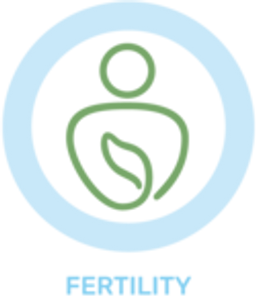GENES4LIFE
Most common recessive genes

GENES4LIFE
The test before pregnancy. Both men and women can be healthy carriers of genetic mutations that can cause a disease, without being aware of them.

Highlights
- Provides knowledge about 428 genes related to rare diseases due to recessive inheritance.
- We study more than 100 high-prevalence and treatable diseases as well as more than 400 low-prevalence diseases.
- Genes4Life helps doctors and patients select a genetically compatible sperm or egg donor.
- The Genes4Life panel includes both the Genes2Life and X-Linked Carrier test .
Genes4Life
The genetic test is used to investigate whether there is a risk of having a child with an inherited genetic disease. Hereditary diseases are inherited through genetic material, from one generation to the next. In most cases, families are unaware that there are carriers among them and then conditions suddenly appear in the family; this happens in disorders with recessive inheritance.
Recessive inheritance means that a person can carry disease-related variants without being aware of them.

Can a healthy person transmit a genetic disease?
Anybody can be a healthy carrier of a mutation without knowing. If the man and the woman are carrying a disease-causing mutation, there is a risk of passing it on to the next generation and then the child will be sick.

Types of genetic diseases we investigate with Genes4Life:
Provide knowledge about 428 genes related to rare diseases due to recessive inheritance. We study more than 100 high-prevalence diseases and more than 400 low-prevalence diseases.
LOW PREVALENCE
Genetic diseases: Juvenile amyotrophic lateral sclerosis. Statistics: the prevalence and incidence of JALS are not known. A small number of cases have been reported to date. The disorder has been described in various ethnic groups. Genetic diseases: Bloom syndrome. Statistics: Bloom syndrome (BSYN) overall prevalence is unknown. Ashkenazi Jewish population is estimated at approximately 1/48000 births. Genetic diseases: Triple-A syndrome. Statistics: Prevalence is unknown but less than 100 cases have been published since the first description in 1978. Reference: https://www.orpha.net/consor/cgi-bin/index.php?lng=EN
HIGH PREVALENCE
Genetic diseases: Spinal muscular atrophy. Statistics: 1 in 6000-10000 children are born with the disease. In the United Kingdom, approx. 2000-2500 children and adults with SMA. Genetic diseases: Cystic fibrosis Statistics: Approx. 1 in 30 people is a healthy carrier of cystic fibrosis without knowing it. In Denmark, 1-2 children are born with cystic fibrosis every month. This represents approx.150000 people in Denmark. Genetic diseases: Lysosomal diseases such as Tay-Sachs, Sandhoffs, Niemann, Gauchers, Mannosidose, Fukosidose, Sialidose, Hurlers, Hunter, Sanfilippos, Morquios, I-cell, Cystinose, Sallas, Wolmans. Statistics: Approx. 70 different lysosomal diseases. Each of these is very rare, but as a group, they affect about 1 in 5000-8000 newborns. Every year, about 10 children are born with one of these diagnoses in Denmark.
Genetic testing plays an essential role in fertility treatments. One of the reasons why fertility treatments may fail is the presence of genetic mutations that can lead to repeat abortions and unsuccessful treatments.
We recommend Genes4Life
- For couples trying to get pregnant.
- Before starting an assisted fertilization treatment.
- Before starting treatment with donor eggs or sperm. Both client and donor can be healthy carriers of diseases with a genetic mutation in the same gene.
How to do the test?
To do the test, a sample of saliva or blood is necessary. To collect the saliva sample, we will send a sample collection kit with instructions for collecting the sample, and shipping instructions for sending the sample to Amplexa Genetics.
You can expect a response no later than four weeks after we have received your sample.

THE ANALYSIS
Genes4Life test is best used to screen for partner compatibility. By screening both parents, the test can ensure that no two copies of the same disease-causing gene are present. This is especially useful for parents when selecting donors for fertility treatment.
The Genes4Life panel includes both the Genes2Life and X-Linked Carrier test genes as well as many others. The panel is regularly updated according to the newest recommendations and knowledge obtained in the field of genetic diseases.

Evaluation
Genetic variants are evaluated according to the ACMG guidelines. Based on the evaluation, variants are classified into five classes:
- Class I: Benign
- Class II: Likely benign
- Class III: Uncertain significance
- Class IV: Likely pathogenic
- Class V: Pathogenic
Classification of reported variants
- Class IV
- Class V
All variants are evaluated based on current knowledge, and interpretation may change as new information becomes available.

Limitations
The analysis is limited to protein coding regions and 10 bp from the exon-intron boundaries including splice sites of the genes within the Genes4Life panel. Non-coding regions, 5´-UTR, 3´-UTR, and promoter regions will not be analyzed, nor will large rearrangements, duplications, and insertions. Associations between genotype and phenotype are reported only as relevant to the indication for choosing the selected panel; some of the genes on the current panel may be involved in phenotypes not stated in the report.
To learn more about how Genes4Life can assist your IVF program, please contact one of our experts for more information.

